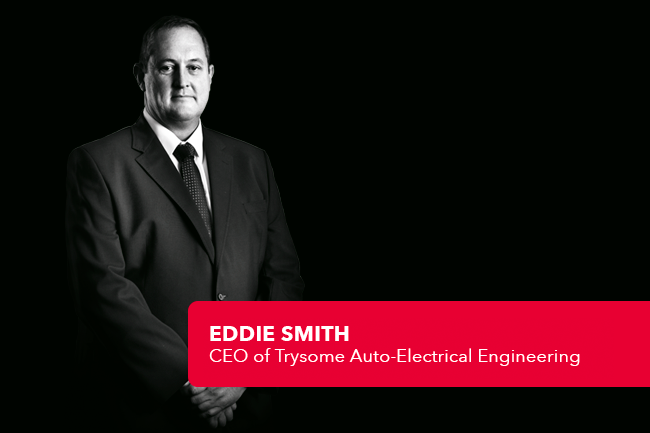Looking at the list of state-of-the-art auto-electrical components and safety systems in Trysome’s product range, one quickly gets a sense of how much the industry has developed in recent years. The company’s client base covers the mining, construction, material handling, transport and light-duty automotive industries – all of which now use big data and highly connected equipment. It’s a far cry from 1991, when Eddie Smith launched the company. Then, his factory comprised a small workshop and his office was the passenger seat of his 4×4 bakkie.
‘There weren’t even cellphones then,’ he says, remembering those early days. ‘There has been amazing growth since then, both for myself and for the company. We could have sat back and, like a lot of companies, resisted the technology. Instead we embraced it and worked with it.’
That approach has enabled Trysome to position itself at the cutting edge of the industry, making it the largest supplier of heavy-duty auto-electrical components and collision-avoidance systems in Southern Africa.
‘Technology has changed, and the industry has moved with the technology,’ says Smith. ‘We’re at a point now where we have our own engineers, and we’re starting to develop our own products locally in South Africa. That’s also a result of the Mining Charter, which requires a percentage of local development. We have embraced that, and worked closely with universities like Wits and the University of Pretoria to come up with new technologies.
‘A lot of development is outsourced from all over the world, but I feel we have the technology and the capabilities within South Africa to start manufacturing locally.’
Smith says technological changes have also led to a shift in the type of people Trysome now employs. ‘There’s a bigger demand now for engineering people in our industry,’ he says. ‘The typical matriculants who come out of school have to further develop their knowledge in electronic engineering, because the technology has advanced so much.’
The demands of the mining and construction environments, however, have not changed. The conditions are still harsh and tough, and the requirements for reliable, high-quality safety equipment are as strict as they’ve ever been.
‘That’s why we got involved in the development of collision-avoidance systems,’ says Smith. ‘Since then, the safety demand has grown to include fatigue management. With wireless networks in mines, you now get data that lets you manage the safety risks and the equipment a lot more efficiently.’
Reflecting on Trysome’s origins – where Smith was, as he describes it, a ‘one-man show’, drawing on his experience as an auto-electrician at Komatsu – he says the biggest drivers of growth were his integrity, ethics and honesty. ‘Those are fundamental to the growth of any business. You also have to surround yourself with good people,’ he adds.
Trysome currently has a national staff complement of 366 ‘good people’, based at the company’s head office in Boksburg, and at branches in Middelburg, Cape Town, Durban, Rustenburg and Kathu. It also has two distributors in Namibia, and its own entities in Botswana, Zambia and Mozambique.
Again, Smith has a fairly simple formula for managing the company’s cross-border growth. ‘You need to make regular visits, and you need to appoint the right people,’ he says. ‘Regular visits help them feel part of the family – and then managing an entity in, say, Botswana is not really different to managing an entity in Durban or Cape Town. You just need to understand what the local regulations and requirements are.’
Smith’s approach to business leadership is summed up in his own job description. ‘I’m a hands-on CEO,’ he says. ‘I get involved where I’m needed. I also focus on new developments and the growth of the company. So I’m not a typical CEO who focuses on the financials. I see customers and I get involved with the teams on a daily basis.’
Smith is currently overseeing the company’s expansion – both geographically and in terms of its development work. ‘The business is divided into segments, so we’ll have a division within Trysome that will focus on new product development,’ he says.
‘Through the years, we’ve tried to keep those divisions apart – not as separate entities, but managed separately – so there was no cross-pollination between managers and what their responsibilities were, and so that the teams could focus on their specific areas.’
Smith’s comment about ‘focusing on the financials’ takes on new significance considering Trysome’s growth has been entirely self-funded, with no external financial assistance. ‘That’s definitely given us independence, and the ability to grow at our own pace,’ he says. ‘Nobody could slow us down, and we didn’t have the burden of debt repayments. It was a lot freer, with a lot less red tape.’
When you’re a hands-on CEO, that is exactly the freedom you want.



